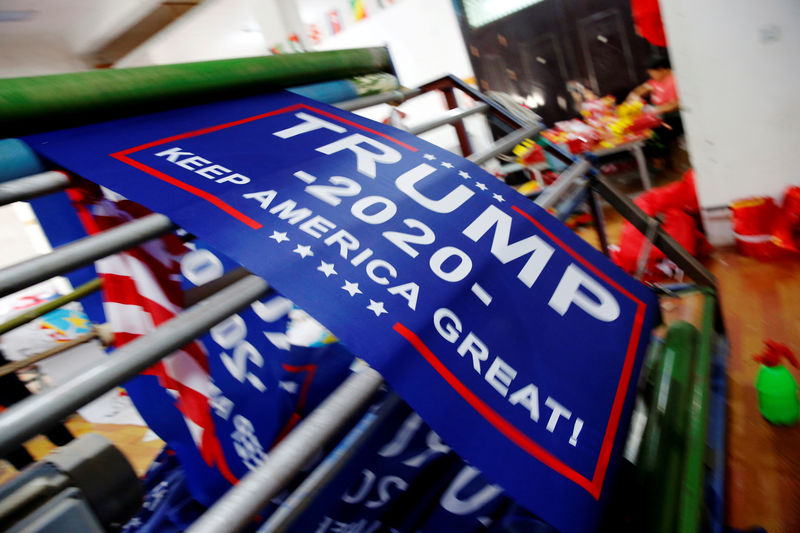By Steve Holland
WASHINGTON (Reuters) - President Donald Trump's re-election campaign is preparing an early focus on Pennsylvania, Michigan and Wisconsin, states that were instrumental to his improbable 2016 victory but where his support has softened, two campaign advisers said.
The decision to accelerate campaign organizing and eventually get the Republican president to make trips to the three states is a recognition that Trump's path to re-election in 2020 will need to repeat some of the successes he had in 2016.
Advisers also see a need to bolster Trump's support in Florida, a battleground state he considers his second home but where opinion polls show him struggling.
They also see an opportunity for gains in Minnesota and Colorado, two states Trump narrowly lost. The Trump team views those states as competitive places where the president can go on offense, according to the advisers, who asked not to be named so they could speak freely about the campaign strategy.
With 20 months to go until the November 2020 presidential election, Trump and his campaign team are still getting organized for what is expected to be a tough battle for a second four-year term.
Democrats seized control of the House of Representatives in last November's congressional elections widely seen as a referendum on Trump's storm-tossed first two years in office, while Republicans strengthened their grip on the U.S. Senate.
More than a dozen Democrats have lined up so far to challenge Trump, and some Republicans are also considering running against him.
Chris Jackson, a pollster for Ipsos, which conducts polls with Reuters, said Trump, however, looked to be in a competitive position for re-election at this point, given his approval rating is hovering between 40 percent and 45 percent.
"Presidents with an approval rating above 40 percent generally have better than 50-50 odds of winning re-election," he said. "He's not an underdog if you take the big picture view."
Trump's support among Republican voters also remains strong.
CRITICAL STATES
Trump's win in 2016 included unexpected victories in Pennsylvania, Michigan and Wisconsin, which form part of the country's former industrial heartland. The trio of states had voted Democratic in recent presidential elections, but Trump caught Democratic nominee Hillary Clinton by surprise, winning them by a mere combined 77,000 votes.
An Emerson (NYSE:EMR) College poll of Michigan voters released on Sunday found Trump trailing all the leading potential Democratic challengers, including an 8-percentage-point deficit to former Vice President Joe Biden, who is considering a White House bid.
A Marquette Law School poll conducted in January during a government shutdown largely blamed on Trump found the president had a 44 percent approval rating among Wisconsin voters, with 52 percent disapproving. The political tracking organization Morning Consult found Trump down 7 points among Pennsylvania voters.
Asked about the re-election strategy, a senior Trump campaign official said the early focus on the three states had nothing to do with polling.
"It is about securing victory in states where the margin of victory was close in 2016," the official said.
The official added: "These are not given Republican states. These are Trump states. Wisconsin had not gone red since 1984 and Pennsylvania and Michigan since 1988. Trump expanded the map, and now we must protect this territory."
Republican strategist Scott Reed, who is not connected to the Trump campaign, said the three states would be critical for Trump.
"Wisconsin, Pennsylvania and Michigan put Trump over the top, and they are clearly where this next national election will be won or lost," said Reed, who was campaign manager for Republican nominee Bob Dole’s 1996 White House campaign.
Aides say Trump has shown a keen interest in his re-election effort. In the absence of an obvious front-runner among the Democrats, the president has concentrated his attacks on what he calls the Democrats' trend toward socialism with their "Green New Deal."
Trump has talked privately about some of the Democratic field, telling allies that Senator Kamala Harris of California had the best campaign rollout. He described Biden as “dumb” in a lunch with television anchors ahead of his State of the Union address on Feb. 5, a source familiar with the lunch said.
Trump's campaign team recently showed the president a slide show outlining how to organize, tie up Republican nominating delegates and control the Republican presidential nomination process to fend off any challengers, a Republican official familiar with the presentation said.

“We are running a comprehensive, state-of-the-art campaign,” the senior campaign official said.